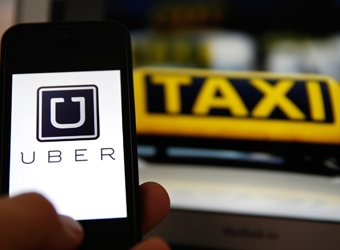Uber was close on Sunday to finalising an agreement to sell a major stake of itself to SoftBank, a Japanese conglomerate, paving the way for the ride-hailing company to make sweeping governance changes and to go public by 2019.
Under the agreement, a consortium of investors led by SoftBank will buy at least 14 percent of Uber through a combination of new and existing stock, according to three people briefed on the process, who spoke on condition of anonymity because those details are confidential. SoftBank plans to buy about $1 billion of fresh stock at Uber’s current valuation of about $68.5 billion, but the bulk of the deal will be purchasing existing Uber shares from current investors.
SoftBank is to buy the existing Uber shares in a process called a tender offer, which takes at least a month to complete. During that process, a price will be set for the existing Uber shares. If investors are reluctant to sell and SoftBank cannot hit its threshold of 14 percent ownership of Uber, SoftBank can walk away from the deal, the people said.
An Uber spokesman declined to comment on Sunday. People from SoftBank did not immediately respond to requests for comment.
The agreement follows an Oct. 3 Uber board meeting, in which directors voted to move forward with an investment from SoftBank. As part of the deal, Uber’s board agreed to carry out a set of sweeping governance changes, including measures that reduce the influence that Travis Kalanick, Uber’s former chief executive, has at the company. He still has a seat on the company’s board. The SoftBank investment also sets up Uber to go public by 2019, another provision that was contingent on the deal.
Since that meeting, SoftBank, Uber and Uber’s early investors have haggled over deal terms. Some of Uber’s early investors, like the venture capital firm Benchmark, initially wanted to retain certain shareholder rights that they hold through their Uber stock, according to two of the people briefed on the discussions. Benchmark and others ultimately agreed to waive those rights in exchange for concessions from SoftBank over the tender offer process, the people said.
Benchmark has agreed not to work with other investors to prop up the price during the tender offer. The firm will also suspend the lawsuit that it filed against Mr. Kalanick, and drop the suit upon completion of the tender offer.
SoftBank plans to purchase the Uber shares along with other investors, including Dragoneer, an investment firm. SoftBank will gain two Uber board seats as part of the investment.
Uber does not necessarily need new money, as it has raised more than $10 billion in debt and equity and has some $5 billion in the bank. But the SoftBank investment will let some of the company’s investors sell their shares to lock in huge gains. Early employees also stand to sell for significant sums.
SoftBank also owns pieces of ride-hailing companies around the world, including Didi Chuxing in China, Ola in India, Grab in Southeast Asia and 99 in Brazil. The firm, led by Masayoshi Son, could help Uber navigate its relationships with those global rivals. Uber left the China market in 2016 by selling its operation to Didi and taking a minority investment stake in the new company.
SoftBank’s investment in Uber pressures Uber’s main American rival, Lyft, to raise more money to compete on driver incentive deals and lower prices. As the two companies battle for market share, both have lost hundreds of millions of dollars a year.
Source: The New York Times
